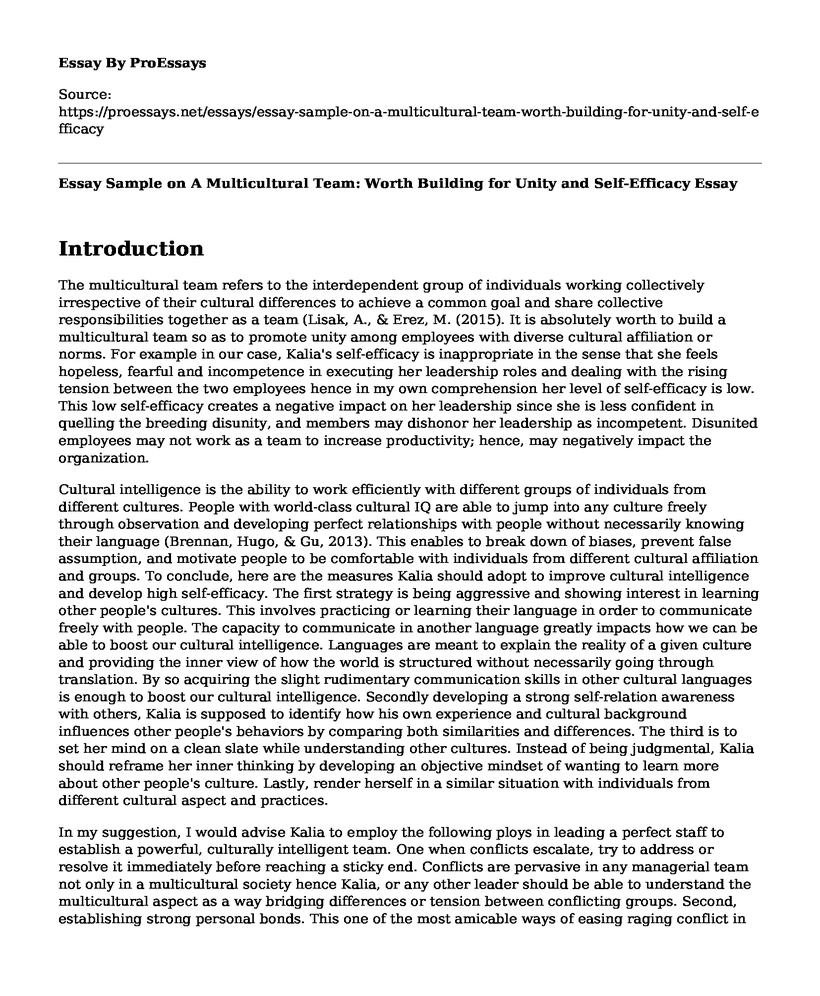Introduction
The multicultural team refers to the interdependent group of individuals working collectively irrespective of their cultural differences to achieve a common goal and share collective responsibilities together as a team (Lisak, A., & Erez, M. (2015). It is absolutely worth to build a multicultural team so as to promote unity among employees with diverse cultural affiliation or norms. For example in our case, Kalia's self-efficacy is inappropriate in the sense that she feels hopeless, fearful and incompetence in executing her leadership roles and dealing with the rising tension between the two employees hence in my own comprehension her level of self-efficacy is low. This low self-efficacy creates a negative impact on her leadership since she is less confident in quelling the breeding disunity, and members may dishonor her leadership as incompetent. Disunited employees may not work as a team to increase productivity; hence, may negatively impact the organization.
Cultural intelligence is the ability to work efficiently with different groups of individuals from different cultures. People with world-class cultural IQ are able to jump into any culture freely through observation and developing perfect relationships with people without necessarily knowing their language (Brennan, Hugo, & Gu, 2013). This enables to break down of biases, prevent false assumption, and motivate people to be comfortable with individuals from different cultural affiliation and groups. To conclude, here are the measures Kalia should adopt to improve cultural intelligence and develop high self-efficacy. The first strategy is being aggressive and showing interest in learning other people's cultures. This involves practicing or learning their language in order to communicate freely with people. The capacity to communicate in another language greatly impacts how we can be able to boost our cultural intelligence. Languages are meant to explain the reality of a given culture and providing the inner view of how the world is structured without necessarily going through translation. By so acquiring the slight rudimentary communication skills in other cultural languages is enough to boost our cultural intelligence. Secondly developing a strong self-relation awareness with others, Kalia is supposed to identify how his own experience and cultural background influences other people's behaviors by comparing both similarities and differences. The third is to set her mind on a clean slate while understanding other cultures. Instead of being judgmental, Kalia should reframe her inner thinking by developing an objective mindset of wanting to learn more about other people's culture. Lastly, render herself in a similar situation with individuals from different cultural aspect and practices.
In my suggestion, I would advise Kalia to employ the following ploys in leading a perfect staff to establish a powerful, culturally intelligent team. One when conflicts escalate, try to address or resolve it immediately before reaching a sticky end. Conflicts are pervasive in any managerial team not only in a multicultural society hence Kalia, or any other leader should be able to understand the multicultural aspect as a way bridging differences or tension between conflicting groups. Second, establishing strong personal bonds. This one of the most amicable ways of easing raging conflict in any managerial team. In a dynamical world of different cultural norms, it is better to establish good rapport and personal connections as a way of resolving conflicts (Lisak, Erez, Sui, & Lee, 2016). The third is understanding the team's cross-cultural makeup. Any influential leader of cross-cultural teams needs to put into consideration differences in language, cultural differences, and mistake within the managerial team as well as any prevalent miscommunication and misconception. And lastly is to establish clear standards of norms to be followed and strictly sticking to them. In a multicultural management, every person gonna bring different norms and working styles; hence, the leader should categorically set clear cultural norms to be followed.
References
Brennan, R. W., Hugo, R. J., & Gu, P. (2013). Reinforcing skills and building student confidence through a multicultural project-based learning experience. Australasian Journal of Engineering Education, 19(1), 75-75.
Lisak, A., & Erez, M. (2015). Leadership emergence in multicultural teams: The power of global characteristics. Journal of World Business, 50(1), 3-14.
Lisak, A., Erez, M., Sui, Y., & Lee, C. (2016). The positive role of global leaders in enhancing multicultural team innovation. Journal of International Business Studies, 47(6), 655-673.
Cite this page
Essay Sample on A Multicultural Team: Worth Building for Unity and Self-Efficacy. (2023, Feb 23). Retrieved from https://proessays.net/essays/essay-sample-on-a-multicultural-team-worth-building-for-unity-and-self-efficacy
If you are the original author of this essay and no longer wish to have it published on the ProEssays website, please click below to request its removal:
- Risks and Rewards of Alternate Delivery Methods
- Toyota Risk Analysis Paper Example
- Reflection on a Discussion on U.S Constitution Day Paper Example
- The Congress' Responsiveness to the Mass Public - Essay Sample
- Article Analysis Essay on Are You a Robot
- Paper on Organizational Culture: Driving Change through Awareness, Ability, and Motivation
- Crisis Management Planning Case Study of Holiway Garden Resort & Spa in Bali and the Volcano Agung







